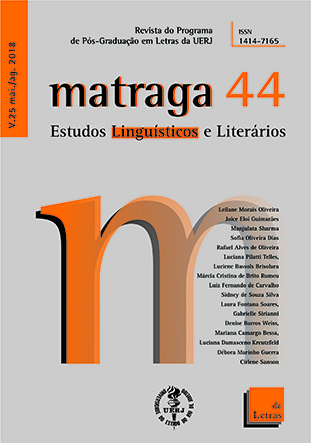Why the hell are cuss words not included in teaching of Portuguese as foreign language?!
DOI:
https://doi.org/10.12957/matraga.2018.37266Palavras-chave:
Palavrões, Ensino de português como PLE, Lexi-cultura, Competência Intercultural.Resumo
This brief study of Brazilian swear words is an attempt to understand the non-inclusion of swear words in the teaching of Portuguese as a foreign language as they are considered as taboo lexicon from the point of view of the institutionalized normative standard language supervised periodically by the Academies. I argue that, since the swear words form a part of the repertoire of popular colloquial vocabulary, they represent the popular culture through their intensity of emotional expression and contextual use. I use the Theory of Lexiculture, proposed by Galisson (1987), and Functional Grammar, by Halliday (2004), to argue that swear words should be introduced through figures of speech such as euphemism and dysphemism, as well as comparisons between swear words of native language of the learner and that of the target language to give the learner a better understanding of the emotional aspect of the language and to foster better pragma-linguistic, socio-pragmatic competence and intercultural competence for the learner of Portuguese as a Foreign Language.
------------------------------------------------------------------------------------
POR QUE DIABOS PALAVRÕES NÃO SÃO INCLUÍDOS NO ENSINO DE PORTUGUÊS COMO LÍNGUA ESTRANGEIRA?!
Este trabalho tem intuito de investigar a exclusão dos palavrões brasileiros no ensino do português como língua estrangeira por serem considerados vocabulário tabus do ponto de vista da língua normativa institucionalmente padronizada e periodicamente supervisionada pelas Academias. Eu pressuponho que desde os palavrões formam o repertório do léxico coloquial popular, eles representam a cultura popular através da intensidade da expressão afetiva e o uso contextual. Eu pretendo utilizar a Teoria de Lexicultura de Galisson (1987) e Gramática Funcional de Halliday (2004) para afirmar que os palavrões devem ser apresentados através de ato da fala como eufemismo e disfemismo bem como através de estudos comparatistas entre a língua-alvo e a língua materna, para apresentar ao discente uma compreensão melhor do aspecto emotivo da língua com o intuito de fundar nele a noção de competências pragma-linguística, sócio pragmática e interculturais do PLE.
---
Original em inglês.
Downloads
Downloads
Publicado
Como Citar
Edição
Seção
Licença
AUTORIZAÇÃO
A Matraga – Revista do Programa de Pós-Graduação em Letras da UERJ está autorizada a publicar o artigo ora submetido, caso seja aceito para publicação online. Fica atestado que a contribuição é original, que não está sendo submetida a outro editor para publicação, e que a presente declaração é a expressão da verdade.
Os trabalhos publicados no espaço virtual da Matraga – Revista do Programa de Pós-Graduação em Letras da UERJ serão automaticamente cedidos, ficando os seus direitos autorais reservados à Matraga. Sua reprodução, total ou parcial, é condicionada à citação dos autores e dos dados da publicação.

A Matraga utiliza uma Licença Creative Commons - Atribuição-NãoComercial 4.0 Internacional.





